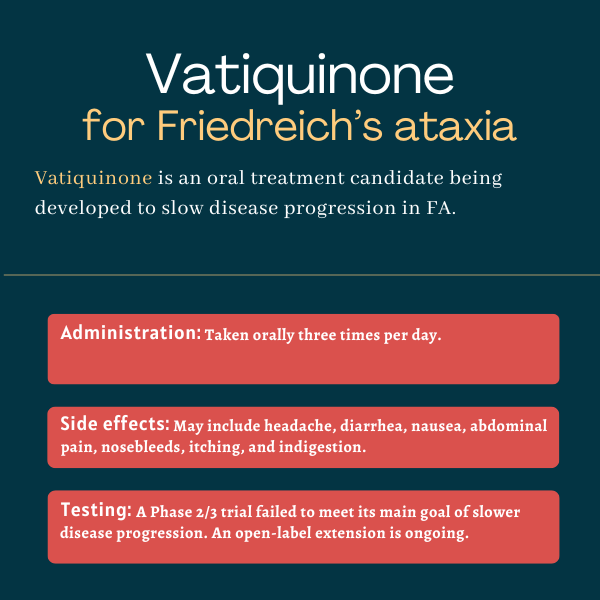 Discussion
Discussion
FAQs about Vatiquinone
PTC Therapeutics had asked the U.S. Food and Drug Administration (FDA) to approve vatiquinone for treating people with Friedreich’s ataxia, but in 2025, the FDA rejected that application, saying available data weren’t sufficient to prove the therapy is effective. The FDA has said that an additional clinical trial would be needed to support a resubmission of the application. Therefore, it’s not clear when or if the FDA will approve vatiquinone.
Vatiquinone is an experimental therapy that has not been approved for treating Friedreich’s ataxia (FA) and is still in development. It’s designed to limit neuroinflammation and nerve cell damage in people with FA by blocking the activity of an enzyme called 15-lipoxygenase, with the ultimate goal of slowing disease progression. A Phase 2/3 clinical trial failed to show a significant effect of vatiquinone on overall neurological disability, though significant effects were seen in a subscale measuring upright stability.
Because vatiquinone is still in development, studies examining its interaction with alcohol are lacking. Patients who wish to drink alcohol while taking the medication should discuss this issue with their doctors.
In a Phase 2/3 clinical trial, vatiquinone was not better than a placebo at slowing a measure of overall neurological disability after 1.5 years of treatment, but a significant effect was seen on a measure of upright stability. More data is needed to determine if the therapy can effectively slow disability progression and, if so, how soon patients may see benefits with treatment.
Side effects of vatiquinone reported in the MOVE-FA Phase 2/3 clinical trial were headache, digestive complaints, nosebleeds, itching, blood clotting abnormalities, stiffness, and chest pain. It’s recommended that patients speak with their healthcare providers to understand how the medication may affect them. Patients should also report any unanticipated side effects of vatiquinone to their doctors.
Related Articles
 Fact-checked by
Fact-checked by 



